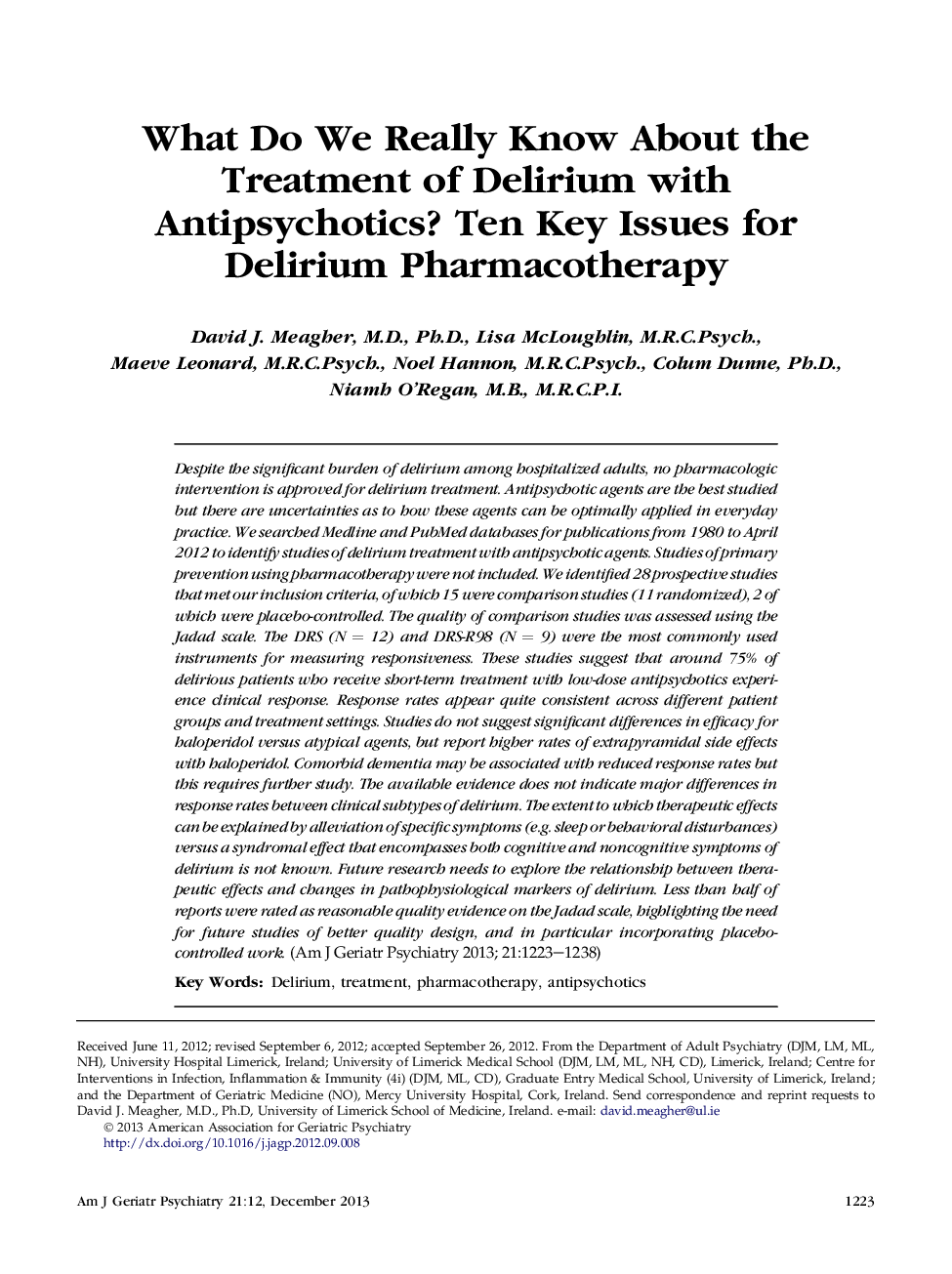| کد مقاله | کد نشریه | سال انتشار | مقاله انگلیسی | نسخه تمام متن |
|---|---|---|---|---|
| 6003870 | 1579359 | 2013 | 16 صفحه PDF | دانلود رایگان |
عنوان انگلیسی مقاله ISI
What Do We Really Know About the Treatment of Delirium with Antipsychotics? Ten Key Issues for Delirium Pharmacotherapy
ترجمه فارسی عنوان
ما در مورد درمان دلیریم با داروهای ضدپرسی چه می دانیم؟ ده مسائل کلیدی برای داروهای ضد افسردگی دلیریم
دانلود مقاله + سفارش ترجمه
دانلود مقاله ISI انگلیسی
رایگان برای ایرانیان
کلمات کلیدی
دلیری، رفتار، فارماکوتراپی، ضد روانپزشکی
موضوعات مرتبط
علوم پزشکی و سلامت
پزشکی و دندانپزشکی
مغز و اعصاب بالینی
چکیده انگلیسی
Despite the significant burden of delirium among hospitalized adults, no pharmacologic intervention is approved for delirium treatment. Antipsychotic agents are the best studied but there are uncertainties as to how these agents can be optimally applied in everyday practice. We searched Medline and PubMed databases for publications from 1980 to April 2012 to identify studies of delirium treatment with antipsychotic agents. Studies of primary prevention using pharmacotherapy were not included. We identified 28 prospective studies that met our inclusion criteria, of which 15 were comparison studies (11 randomized), 2 of which were placebo-controlled. The quality of comparison studies was assessed using the Jadad scale. The DRS (NÂ = 12) and DRS-R98 (NÂ = 9) were the most commonly used instruments for measuring responsiveness. These studies suggest that around 75% of delirious patients who receive short-term treatment with low-dose antipsychotics experience clinical response. Response rates appear quite consistent across different patient groups and treatment settings. Studies do not suggest significant differences in efficacy for haloperidol versus atypical agents, but report higher rates of extrapyramidal side effects with haloperidol. Comorbid dementia may be associated with reduced response rates but this requires further study. The available evidence does not indicate major differences in response rates between clinical subtypes of delirium. The extent to which therapeutic effects can be explained by alleviation of specific symptoms (e.g. sleep or behavioral disturbances) versus a syndromal effect that encompasses both cognitive and noncognitive symptoms of delirium is not known. Future research needs to explore the relationship between therapeutic effects and changes in pathophysiological markers of delirium. Less than half of reports were rated as reasonable quality evidence on the Jadad scale, highlighting the need for future studies of better quality design, and in particular incorporating placebo-controlled work.
ناشر
Database: Elsevier - ScienceDirect (ساینس دایرکت)
Journal: The American Journal of Geriatric Psychiatry - Volume 21, Issue 12, December 2013, Pages 1223-1238
Journal: The American Journal of Geriatric Psychiatry - Volume 21, Issue 12, December 2013, Pages 1223-1238
نویسندگان
David J. M.D., Ph.D., Lisa M.R.C.Psych., Maeve M.R.C.Psych., Noel M.R.C.Psych., Colum Ph.D., Niamh M.B., M.R.C.P.I.,
